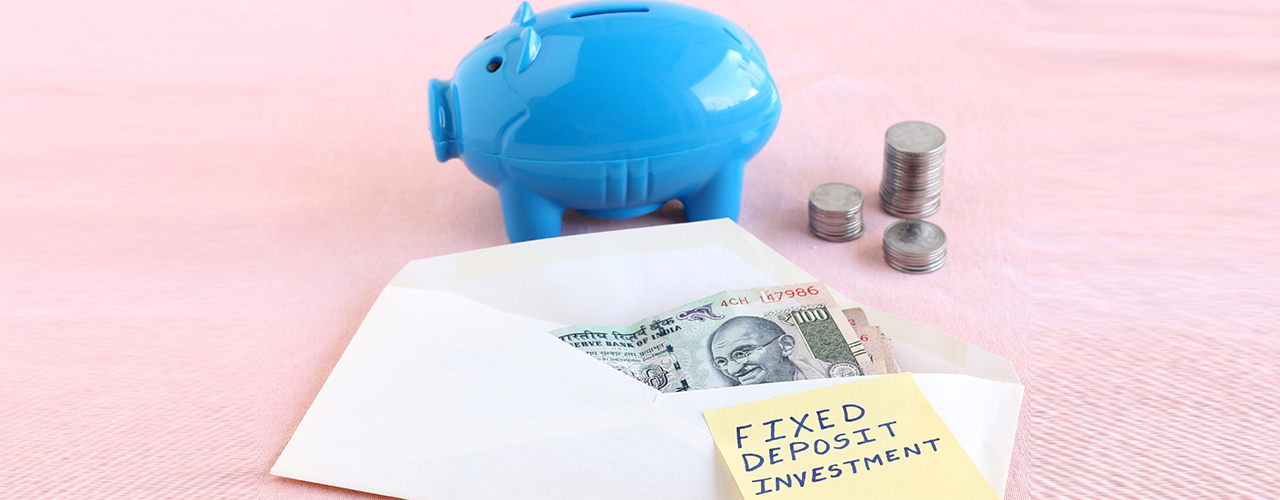Fixed Deposits

For most Indian investors, FDs, fixed deposits, have been a sacrosanct way to park their money. A few years ago, there was a trend where FDs were considered to be a rather low-return invetsment. With so many other market-related products that offered higher returns, FDs did lose some of their popularity, but when the pandemic hit us, it was ascertained, that FDs need to be an integral part of almost every financial portfolio. The compounding power of FDs, the guaranteed returns, and the flexibility of tenure and deposit amounts are some major reasons why FDs continue to be popular.
What are FDs?
No matter which financial tool you are planning to invest in, knowing how it works is always more suitable. Let us learn more about fixed deposits and how to make the most of them.
A fixed deposit or an FD is a one-time account where a fixed sum of money is deposited for a fixed period of time. The rate of interest is specified for different tenures. When the term comes to an end, you get the principal amount along with the interest. This way, the maturity amount/ the return you receive is fixed.
| Rate of Interest | 1.85% to 7.9% per year; can vary from bank to bank |
| Deposit Amount | Minimum: INR 1,000; can vary from bank to bank Maximum: Can vary from bank to bank |
| Tenure of the Investment | Can be from 7 days to 10 years |
| Frequency of the Interest Compound | Monthly, Quarterly, or Annually |
| Premature Withdrawal | Permitted with Fine |
| Premature Closure | Permitted with Fine |
As FDs are not linked to market fluctuations, they are deemed to be a secure way of parking money. FDs are offered by almost all banks and financial companies. The procedure to open an FD is very simple and convenient and can be done online in no time.
Types of FD
You have a lot of options when it comes to choosing the right FD, take a look:
Here, the interest is accumulated until the maturity period ends. You receive the principal and the interest together at the time of maturity.
Non-cumulative FDs are a great way to earn regular interest on your investment. The interest payout can be monthly, quarterly, semi-annually, or yearly.
Note: The rate of interest may differ for the payouts.
Designed for individuals who are aged more than 60 years senior FDs give a higher rate of interest.
These FDs come with a 5-year lock-in period. You can get up to INR 1.5 lakh of tax deductions under Section 80C of the Income Tax Act.
Most banks and non-banking financial companies (NBFCs) offer corporate FDs and offer a higher rate of interest.
More About Company FDs
Company FDs also called corporate FDs function very similarly to regular FDs. Like a regular FD, you deposit a fixed amount of money into a company FD account, for a fixed tenure along with a fixed rate of interest. At the end of the term, you get the principal amount plus the interest that you have earned over the tenure.
Offered by non-banking financial companies, NBFCs, companies, and firms, the rate of interest offered by a corporate FD is typically higher than regular FDs. When invested rightly, corporate FDs with trustworthy companies can offer higher and safer returns. When you choose a company it is imperative that you pay due attention to their CRISIL and ICRA credit ratings.
Corporate FDs and their ratings
As the FD interest rates have witnessed a rise, investors are scouting for company FDs. however, one needs to be sure that the FD comes with the highest degree of safety. This is where CRISIL, CARE and ICRA ratings come into play. They offer an unbiased view of the creditworthiness of the corporate FD, let’s understand how:
CRISIL is the first thing that investors look out for. A full-service rating agency, it covers banks as well as non-banking companies. A company that receives an FAAA rating is considered highly creditworthy.
These ratings are based on information acquired from sources regarded to be correct and trustworthy. CARE rates debt instruments and bank facilities of manufacturing entities, trading entities, service entities, PSUs etc.
The credit ratings by ICRA are symbolic representations of its opinion on the relative credit risks that are associated with the rated debt obligations/issues. These ratings are assigned on an Indian (could be national or local) credit rating scale for Rupee denominated debt obligations.
When investing one’s hard-earned money, different investors have different preferences. At Moneybeans, we understand that not everyone relishes the suspense that most market-related investments may carry with them. While recession, pandemic, and the ever-changing geo-political systems continue to affect the money market, FDs have retrieved the position of a stable and reliable way to invest. Even if you are an aggressive investor who has a high-risk appetite, fixed deposits would act as a stable foundation for your portfolio. The secured returns would allow you to venture into more volatile investment instruments with confidence.
